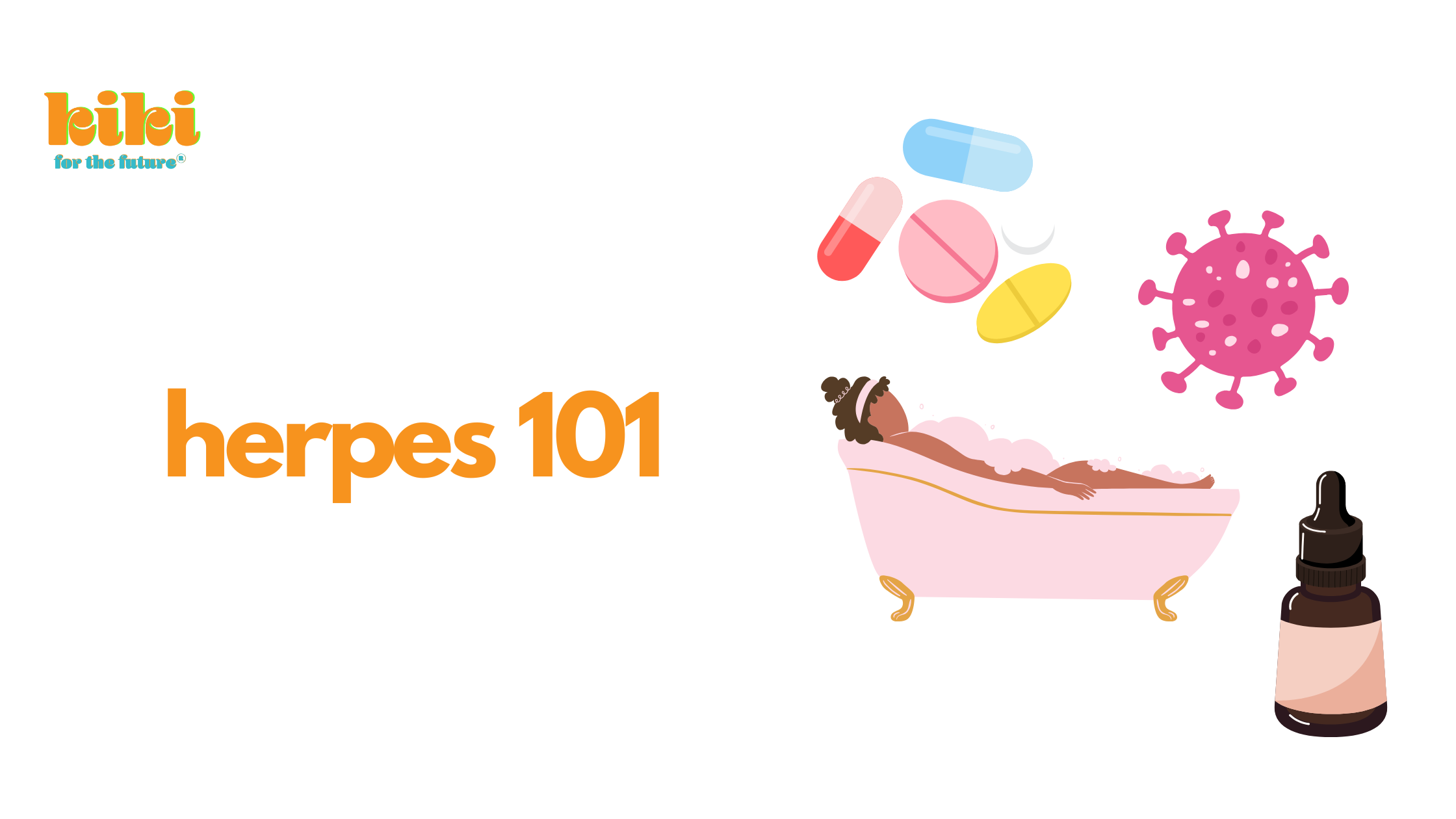Herpes is an extremely common virus that has two major types: HSV-1(oral, sometimes genital) and HSV-2 (genital). This post will focus on HSV-2, which is spread through skin-to-skin contact during sexual activity. HSV-2 is one of the most common STIs, and regardless of your status, you deserve to have safe, pleasurable sex.
TL;DR📚
- What: Herpes Simplex Virus (HSV-1 and HSV-2)
- Type of infection: Chronic, treatable
- Symptoms: Blisters that leave tender sores on the affected areas
- Transmission: Skin-to-skin contact
- Prevention: Using barrier methods like dental dams and condoms, avoiding sex during outbreaks
- Testing: Usually diagnosed via physical exam, lab test if necessary
- Treatment: Antiviral medication, warm baths, anti-inflammatory medication, and other soothing treatment during an outbreak
What Is Herpes?
Herpes is a chronic condition caused by a strain of the Herpes virus. Herpes simplex virus 1 (HSV-1), which can result in either oral or genital sores, affects approximately two in three people in the world. Most people are asymptomatic and don’t even know they have it! Herpes simplex virus 2 (HSV-2), commonly known as genital herpes, affects approximately 1 in 6 people in the world. This is the form of Herpes commonly spread by sexual activity. Fun fact: chickenpox is also a form of herpes!
How Is It Spread?
Herpes is spread by skin-to-skin contact. Genital herpes can be transmitted by coming into contact with sores, genital secretions, or genital skin. It is possible to get herpes from someone who does not have an active outbreak and it is possible to develop genital herpes after receiving oral sex from someone with oral herpes.
How Do I Know If I Have It?
Symptoms
If you have symptoms (some people with herpes never know they have it), the first outbreak of genital herpes is generally the worst. The first outbreak can take place between 2 and 30 days after you contract herpes, and symptoms include painful sores around the genitals (or mouth for oral herpes) as well as swollen lymph nodes, fever, headaches, or body aches. This is a typical immune response to a virus, and herpes positive people report less severe and often less frequent outbreaks the longer they have the virus.
Some people experience prodrome symptoms, which are basically warning signs from your body before an outbreak. These include mild tingling in the genital area or shooting pains in the buttocks, legs, and hips.
Testing
Herpes can be diagnosed through a visual exam, but it is a good idea to request a culture of the outbreak to know which strain you have for sure. This can confirm what kind of treatment you will need as well as give you more information about how to prevent transmission.
What Treatments Are Available?
For either HSV-1 or HSV-2, oral antiviral medications are available to shorten the length and severity of an outbreak. These medications can also be a part of a daily suppression therapy regimen to reduce viral shedding, aka decreasing the chance of transmitting the virus to your partners.
During prodromal symptoms or an outbreak, it is recommended to take over-the-counter anti-inflammatory medication like Tylenol or Ibuprofen in addition to taking warm baths to soothe your sores. Wear loose clothing and cotton underwear and use a separate towel for your genitals.
While no treatment will be right for everyone and you should decide what is best for you with the guidance of a medical professional, there are also treatments from traditional medicine and natural remedies that have some proven success with shortening the length and severity of outbreaks. Supplements as well as topical application of lysine, propolis, or zinc may help heal sores faster and herbs like lemon balm, aloe, and peppermint oil are often found in natural topical treatments for herpes. Find more potential natural remedies, of varying proven efficacy here.
Why Is It So Stigmatized?
Herpes has been the butt of many jokes in popular culture, which is one of the reasons people are afraid of testing and disclosure. One reason that it is so stigmatized is due to the lack of education around STIs. People don’t realize how common it is or that it is possible to have a fulfilling, pleasurable sex life with a positive diagnosis. There is also a socialized belief that people with STIs are dirty, promiscuous (and that promiscuity is inherently immoral) and somehow less-than than people without STIs. In reality, anyone can contract STIs like herpes, and someone’s status has no bearing on their worth or morality.
The Bottom Line
The best tool in your arsenal is to know your status. If you suspect you may have herpes, get tested. There is a huge HSV community online with people like Rae Kennedy, Emily Depasse, and Tricia Wise who are working to give support to HSV positive people and destroy the stigma around herpes. Educating yourself and others chips away at the harmful narrative surrounded herpes and other STIs. It is also key to disclose your status in order to protect your current and previous partners and allow them to have all the information they need for their health and informed consent. Rae Kennedy has a thorough disclosure guide for those who need support.
Sources
- NCBI: https://www.ncbi.nlm.nih.gov/books/NBK8157/
- CDC: https://www.cdc.gov/std/herpes/stdfact-herpes-detailed.htm
- Positive Results: https://www.positiveresults.support/toolkit
- Ella Dawson: https://elladawson.com/2016/05/07/so-youve-just-been-diagnosed-with-herpes/
- Today: https://www.today.com/tmrw/sti-stigma-how-we-were-taught-be-ashamed-instead-educated-t191595
- Penn State Hershey: http://pennstatehershey.adam.com/content.aspx?productid=107&pid=33&gid=000079#Treatment%20Approach
___________________________________________________________________________________________________
Download our app on our website!
Sign up for our biweekly newsletter to get our free Queer Pleasure Workbook!
If you enjoy our content and want to to access deep dive blog posts and personal essays about sex and queerness, private chats and video calls for members, and want to support our mission to bridge the sex ed gap for queer folks, join us on Patreon.
We also have merch! Find cheeky queer, sex-positive t-shirts, totes, mugs, and stickers here.
